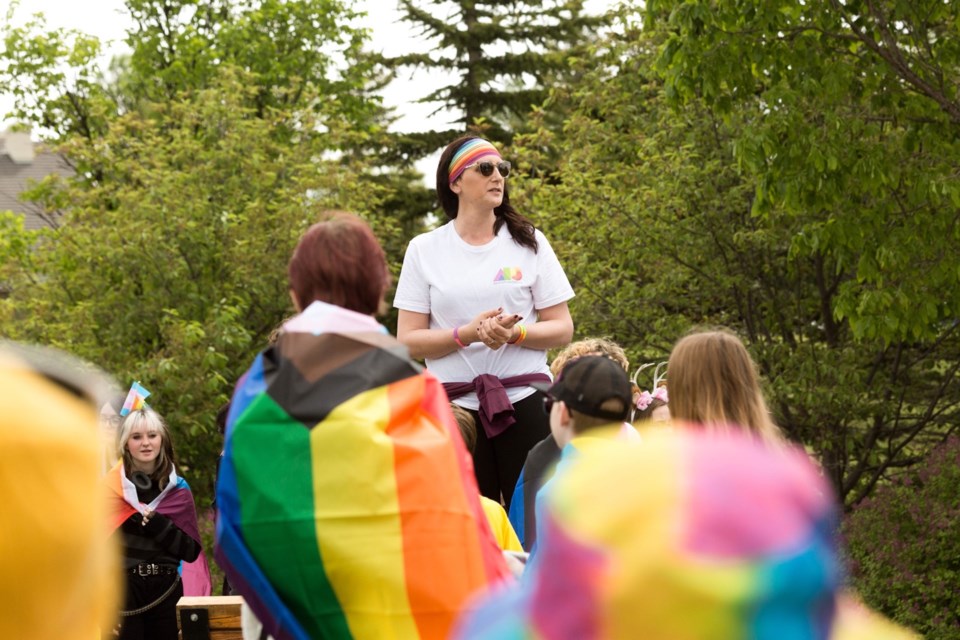One local transgender rights advocate is pointing out the harmful effects of new transgender policies in schools announced by the provincial government last week, and states that, in the end, both sides of the debate want what is best for the safety of Alberta’s youth.
Kiersten Mohr, a local transgender woman, said the policies introduced by Premier Danielle Smith last week are incredibly harmful, transphobic, misinformed, and brought forward with little insight and absolutely no consultation.
While the policies are being touted as "parental rights" policies, Mohr believes the policies would in reality take away the rights of parents and kids.
“[Youth] have always needed parental consent to engage in any kind of hormone, or any kind of treatment with respect to their gender identity,” Mohr said. “So if this were to get in place, kiddos who are in supportive homes with parents and families who understand and are educated and knowledgeable, would literally not be able to choose the most empirically proven pathway to support their children in our province.”
Mohr said the policies on surgeries are misinformed, as surgeries on youth under the age of 18 are already not done in the province.
“That ban and the language and the conversation around it was essentially a tactic to police and politicize the trans and gender-diverse folks in this community,” Mohr said.
She added that no doctor or medical organization who actually works within the LGBTIQA+ was consulted.
Shortly after the policies were announced, the Canadian Paediatric Society and the Alberta Medical Association of Pediatrics condemned the policies.
A big challenge is the perception that there isn’t any kind of standard of practice for working with trans or gender-diverse folks, Mohr said. The World Professional Association of Transgender Health has had standards of care for this community for the last 40 years.
While those on the other side of the conversation state they only want to protect their children, Mohr said so does the LGBTIQA+ community.
Transgender youth are five times more likely to think about suicide and nearly eight times more likely to attempt it than other children. Instead of blocking health care, Mohr believes the approach should be about harm reduction.
In response to the policy that will inform parents of their child’s changed pronouns, Mohr said she does understand in some way.
As a parent, she wants to know what is going on with her children, but she also wants her children to have somebody to talk to if they can’t come to her.
“When I think about it, not as an advocate, but as a parent, I think I certainly do hope that my kids would feel comfortable sharing anything and whatever they needed to with me,” Mohr said. “But, and I put a very, very big but in there, if they don't or if they weren't for whatever reason, I sure as heck hope that they would have somebody.”
For a lot of kids, that safe space is a teacher at school or a Gender and Sexuality Alliance (GSA), Mohr said.
These supports may actually help build the child’s confidence so they can come forward to their parents and have that conversation when they’re ready, she added.
“For me personally, my parents were two of the last people I told, and that wasn't because they weren't affirming or they were unsafe or any of those things,” Mohr said. “It was… I was terrified of losing that relationship with them and I needed a bit of support to be able to prepare myself for that conversation.”
Looking at the suicide statistics for transgender youth, Mohr said the risk of suicide drops by 93 per cent when they have just one supportive person in their life.
Mohr questioned whether people want to roll the dice by refusing to affirm a child’s pronoun change.
Support organizations in the community such as the Skipping Stone Foundation are available to help youth and families navigate the supports that are available.
“I think the hardest thing for me personally is the lack of conversation and consultation,” Mohr said. “I have nothing but empathy and understanding for folks that may just not know. I mean, if this hasn't touched you personally or isn't part of your world, then you just may not know. And that is OK to not know, but in that we need to be asking questions.”
Mohr encouraged youth who are struggling to reach out for help and support, adding there are a lot of people advocating and supporting them.
For those struggling in the community, support is available. Connect with the Airdrie Pride Society for more information on programs.



